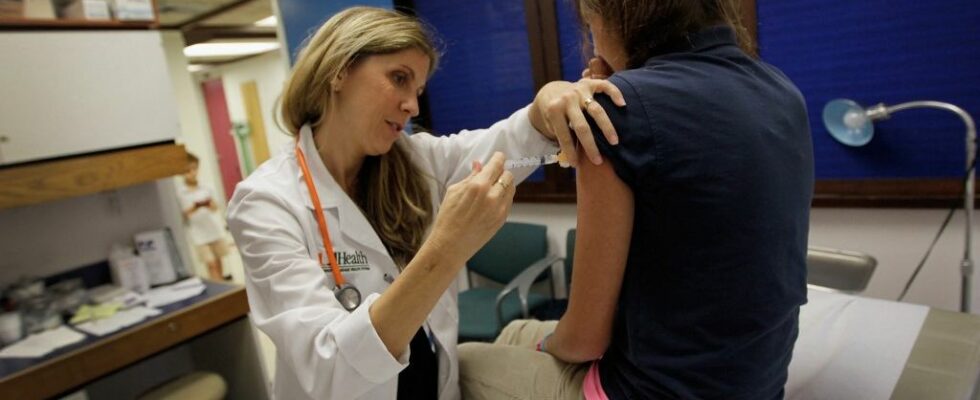Vaccination against papillomaviruses will be generalized in colleges from the start of the next school year, Emmanuel Macron announced on Tuesday, during a trip to Charente. This vaccination will be open to students, girls and boys, in fifth grade, but will not be compulsory. Its main purpose is to fight against cervical cancer.
An announcement that brought back accusations of “ineffectiveness” of the vaccine. In an email addressed to the principal of the college in which Emmanuel Macron went, Angélique Françoise, an unfortunate candidate for the legislative elections who militated for the reintegration of caregivers not vaccinated against Covid-19, worries of a “controversial vaccine, even more dangerous than useful”. The mail was relayed by Alexandra Henrion-Caude, a geneticist who had assertederroneously, that RNA vaccines will genetically modify humans.
In France, three vaccines have received marketing authorization: Gardasil from Merck and Sanofi Pasteur in 2006, Cervarix from GlaxoSmithKline in 2008 and Gardasil 9 since 2018. Gardasil is no longer distributed, it has been replaced by Gardasil 9 which targets more strains of papillomavirus.
FAKE OFF
What do we know about vaccination against papillomaviruses, sixteen years after the first marketing of Gardasil and fourteen years after that of Cervarix? Since 2006, more than 500 million doses of vaccine have been distributed worldwide, reminded the World Health Organization (WHO) in December 2022. The WHO is reassuring about their safety: “Post-registration surveillance has not identified any serious safety concerns to date, with the exception of rare cases of anaphylaxis “. Anaphylaxis is “the most severe manifestation of allergy”, according to Inserm.
A controversy was born in 2013 about Gardasil, after nine women had filed a complaint against X. They wondered about the occurrence of certain diseases after vaccination. The complaint was finally dismissed in 2015.
The WHO rules out a link between these vaccines and the occurrence of autoimmune diseases
In September 2015, Health Insurance and the National Agency for the Safety of Medicines and Health Products ruled out an association between vaccination and the occurrence of an autoimmune disease, after studying a cohort of 2.2 million of girls aged 13 to 16. The two institutions had noted “an increased risk of Guillain-Barré syndrome after vaccination against HPV infections” is “probable”, while noting that “its consequences are limited (1 to 2 cases per 100,000 vaccinated girls) taking into account the rarity of the disease.
The WHO, based on several international studies, also rules out any link between these vaccines and the occurrence of autoimmune diseases: “The data reassuringly indicate that human papillomavirus vaccination does not increase the risk of Guillain-Barré, Bell’s palsy, complex regional pain syndrome or postural orthostatic tachycardia syndrome”. There is also no link found between this vaccination and infertility, adds the international institution.
Papillomaviruses can cause precancerous lesions that can progress to cancer, says the WHO. As these vaccines do not target all strains of papillomavirus, health insurance recommended women aged 25 to 65 to continue screening with Pap smears every three years.
In France, vaccination is recommended for girls and boys aged 1 to 14, with a possible catch-up between 15 and 19 years old. It is also open up to age 26 for men who have sex with other men.

